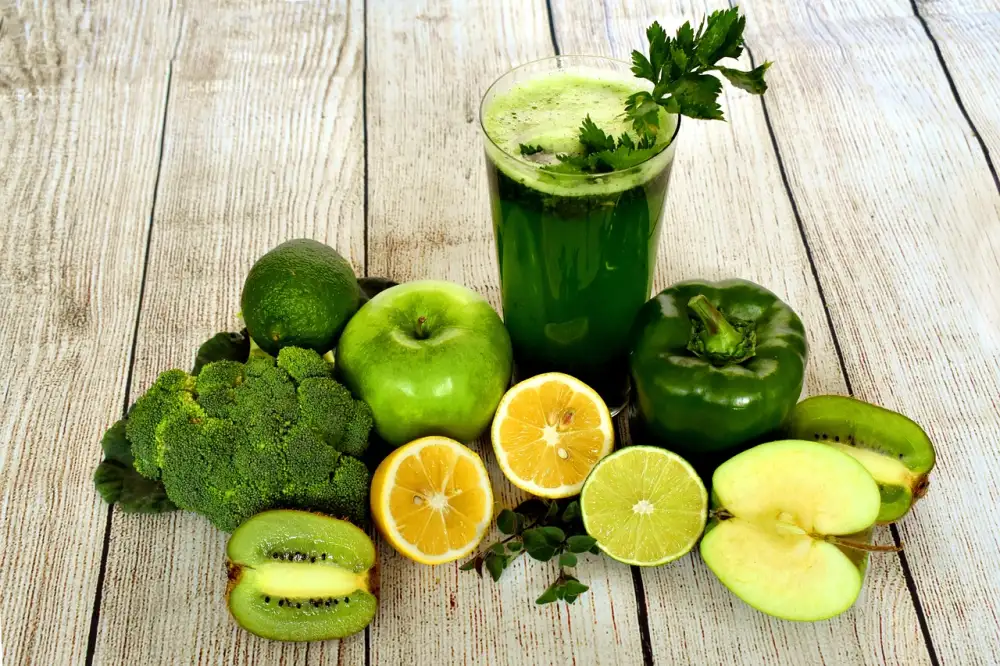Revitalize Your Health with the Ultimate Juice Diet: A Refreshing Path to Wellness

In today's fast-paced world, it can be challenging to maintain a healthy lifestyle. The juice diet offers a refreshing path to wellness, helping you revitalize your health and embrace the benefits of natural, nutrient-rich juices. This diet involves consuming only freshly squeezed or pressed fruit and vegetable juices for a certain period, allowing your body to detoxify and rejuvenate from within. By incorporating the power of nature into your daily routine, you can embark on a journey towards better health and overall well-being. So let's dive into the world of juice diets and discover how they can transform your life.
Benefits of a Juice Diet
A juice diet offers numerous benefits for your overall health and well-being. Firstly, it provides a concentrated dose of essential vitamins, minerals, and antioxidants that are easily absorbed by the body. This helps to boost your immune system, improve digestion, and increase energy levels.
Additionally, a juice diet can aid in weight loss as it is low in calories and high in nutrients. By replacing processed foods with fresh juices, you reduce your calorie intake while still providing your body with the necessary nutrients it needs to function properly.
Furthermore, a juice diet can help to detoxify your body by flushing out toxins and promoting healthy liver function. The high water content in juices also helps to hydrate your body and promote clear skin.
Moreover, a juice diet can improve digestion by giving your digestive system a break from processing solid foods. This allows your body to focus on cleansing and healing itself.
Lastly, a juice diet can also have positive effects on mental clarity and emotional well-being. The nutrient-rich juices provide the brain with essential nutrients that enhance cognitive function and mood stability.
In conclusion, incorporating a juice diet into your lifestyle can bring about numerous benefits for your health. From boosting immunity to aiding in weight loss and improving digestion, embracing the power of fresh juices can revitalize your overall well-being.
How to Start a Juice Diet
Starting a juice diet can be an exciting and rejuvenating journey towards better health. Here are some steps to help you get started:
1. Set your goals: Determine why you want to embark on a juice diet. Whether it's for weight loss, detoxification, or simply improving your overall well-being, having clear goals will keep you motivated.
2. Plan your juices: Research different juice recipes and choose ones that align with your taste preferences and nutritional needs. Aim for a variety of fruits and vegetables to ensure you get a wide range of vitamins and minerals.
3. Invest in a juicer: To make the most out of your juice diet, invest in a good quality juicer that can extract maximum nutrients from the produce. Cold-pressed juicers are highly recommended as they preserve the enzymes and antioxidants present in fruits and vegetables.
4. Stock up on fresh produce: Purchase an abundance of fresh fruits and vegetables from local markets or grocery stores. Opt for organic options whenever possible to minimize exposure to pesticides.
5. Prepare your juices: Start by replacing one meal or snack with a fresh juice each day. Gradually increase the number of juices while reducing solid food intake over time. Remember to drink plenty of water throughout the day to stay hydrated.
6. Listen to your body: Pay attention to how your body reacts to the juice diet. If you experience any discomfort or unusual symptoms, consult with a healthcare professional.
7. Stay consistent: Consistency is key when starting a juice diet. Stick to your plan even when faced with temptations or challenges along the way.
By following these steps, you'll be well on your way towards embracing the health benefits of a juice diet and revitalizing your overall well-being.
Choosing the Right Juices for Your Diet
When embarking on a juice diet, it is essential to choose the right juices that will provide you with the necessary nutrients and support your overall health. Here are some tips to help you make the best choices:
1. Opt for Freshly Squeezed: Freshly squeezed juices retain more vitamins, minerals, and enzymes compared to store-bought options. Invest in a good quality juicer or visit local juice bars for freshly made juices.
2. Variety is Key: Incorporate a wide range of fruits and vegetables into your juices to ensure you receive a diverse array of nutrients. Experiment with different combinations such as kale and apple or carrot and ginger.
3. Go Green: Green juices are packed with chlorophyll, antioxidants, and essential vitamins. Include leafy greens like spinach, kale, and Swiss chard in your juice recipes for an added nutritional boost.
4. Balance Sweetness: While fruits add natural sweetness to your juices, be mindful of their sugar content. Aim to include more vegetables than fruits in your juice recipes to keep the sugar levels in check.
5. Consider Superfoods: Enhance the nutritional value of your juices by adding superfoods such as chia seeds, spirulina, or wheatgrass powder. These power-packed ingredients can provide additional health benefits.
Remember to listen to your body's needs and preferences when selecting juices for your diet. Experiment with different combinations until you find what works best for you. By choosing the right juices, you can maximize the benefits of your juice diet and revitalize your health from within.
Incorporating Solid Foods into Your Juice Diet
While a juice diet primarily consists of consuming fresh juices, it is important to gradually introduce solid foods back into your diet. This helps ensure that your body receives all the necessary nutrients for optimal health.
Start by incorporating easily digestible foods such as steamed vegetables, fruits, and whole grains. These foods provide fiber, vitamins, and minerals that may be lacking in a purely juice-based diet.
It is recommended to consume small portions of solid foods alongside your juice meals. This will help maintain a balanced intake and prevent any sudden spikes in blood sugar levels.
Remember to listen to your body and pay attention to how it reacts to different types of solid foods. Some individuals may find certain foods more difficult to digest than others. Adjust your diet accordingly and choose foods that work well for you.
Gradually increase the amount of solid food you consume over time while still prioritizing fresh juices. This transition period allows your digestive system to adapt and ensures a smooth integration of solid foods back into your routine.
By incorporating solid foods mindfully and in moderation, you can reap the benefits of both juicing and whole food consumption. This combination will provide you with a well-rounded approach to nourishing your body and maintaining overall wellness on your juice diet journey.
Potential Risks and Precautions of a Juice Diet
While a juice diet can offer numerous health benefits, it is important to be aware of the potential risks and take necessary precautions. Firstly, it is crucial to consult with a healthcare professional before starting any new diet, especially if you have any underlying health conditions or are taking medication.
One major concern with a juice diet is the lack of essential nutrients such as protein, fiber, and certain vitamins and minerals. This can lead to deficiencies if not properly managed. It is advisable to incorporate some sources of protein like nuts or seeds into your diet to ensure adequate intake.
Another risk associated with a juice diet is the potential for blood sugar fluctuations. Juices are high in natural sugars from fruits and vegetables, which can cause spikes in blood sugar levels. If you have diabetes or other blood sugar-related issues, it is vital to monitor your levels closely and potentially modify your juice recipes accordingly.
Additionally, prolonged periods on a juice diet may result in low energy levels and feelings of fatigue due to calorie restriction. It is important to listen to your body and make adjustments as needed. If you experience extreme fatigue or other adverse symptoms, it may be necessary to discontinue the diet or seek medical advice.
Lastly, some individuals may experience digestive issues such as bloating or diarrhea when consuming large quantities of juices. To minimize these risks, start with small amounts of juice and gradually increase the quantity over time.
Overall, while a juice diet can be beneficial for many people, it is crucial to approach it with caution and be mindful of any potential risks. Consulting with a healthcare professional and monitoring your body's response throughout the process will help ensure a safe and successful journey towards revitalized health.
Tips for a Successful Juice Diet
1. Start slowly: Gradually introduce juices into your diet and allow your body to adjust to the change.
2. Choose organic produce: Opt for fresh, organic fruits and vegetables to ensure you are getting the most nutrients without any harmful chemicals.
3. Mix it up: Experiment with different juice combinations to keep things interesting and maximize the variety of nutrients you consume.
4. Stay hydrated: In addition to drinking juices, make sure to drink plenty of water throughout the day to stay hydrated.
5. Listen to your body: Pay attention to how your body feels during the juice diet and make adjustments accordingly. If you feel weak or lightheaded, consider incorporating some solid foods or consulting a healthcare professional.
6. Plan ahead: Prepare your juices in advance so that they are readily available when hunger strikes. This will help you stay on track and avoid unhealthy food choices.
7. Seek support: Join online communities or find a juice diet buddy who can provide motivation and share tips and recipes.
8. Be mindful of portion sizes: While juices are nutritious, they still contain calories. Be mindful of portion sizes and don't overconsume.
Remember, a juice diet can be an effective way to revitalize your health, but it's important to listen to your body and consult with a healthcare professional before making any drastic changes to your diet.
In conclusion, a juice diet can be a refreshing and effective way to revitalize your health. By incorporating nutrient-rich juices into your daily routine, you can boost your immune system, improve digestion, and increase energy levels. However, it's important to approach a juice diet with caution and consult with a healthcare professional if you have any underlying health conditions.
Remember to choose a variety of fruits and vegetables for your juices to ensure you're getting a wide range of vitamins and minerals. Gradually introduce solid foods back into your diet after completing the juice cleanse to maintain long-term results.
With proper planning and mindful consumption, a juice diet can provide numerous health benefits and help you achieve your wellness goals. So why not give it a try? Embrace the power of juicing and embark on a journey towards better health today!
Published: 19. 12. 2023
Category: Health



